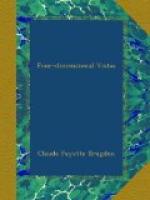Eastern practical psychology and metaphysics can be understood only through a knowledge of Eastern physics. These we would call transcendental, since they recognize not one theatre of consciousness, but three: the gross, the subtle, and the pure. These correspond to the material, the etherial, and the empyreal worlds of Greek philosophy, and to the physical, astral, and mental planes of modern Theosophy. They may be thought of as universal substance in three different octaves of vibration. Upon this, the trained will of man is able to act directly, for the reason that—as claimed by Balzac—it is a living force.
In Eastern hypnotism the gross vibrations of the physical vehicle are inhibited by the will of the operator, putting the body of the subject to sleep, whereat the consciousness, free in its subtle body, awakens to a dimensionally higher world. The operator, by means of questions, reaps such profit as he may by following the “true dreams” of the entranced subject, scrupulously refraining from imposing his own will further than is necessary to obtain the information which he seeks. The higher power of Eastern hypnotism, totally unknown in the West, consists of inhibiting the subtle vibrations of the astral vehicle also, permitting the consciousness to revert to its “pure” condition. In these deep states of trance the subject is able to communicate knowledges shut away from the generality of men—among them the knowledge of past births.
THE SELF-RECOVERED MEMORY OF PAST BIRTHS
The strength of will necessary to accomplish this higher power of hypnotism is achieved by arduous and long-continued exercises in concentration, by the practice of a strict morality, and by submission to a physical regimen which few Occidentals would care to undergo. Severe as is this training, it is less so than that which the true Yogi imposes upon himself, and its fruits are less. The achievement to which he addresses himself is far beyond that of the most accomplished hypnotist. The Yogi scorns all supernormal powers, even while possessing them. The Yogi, as the word implies—it means literally union—seeks to unite himself with his own higher self, the eternal and immortal part of his own nature, and the achievement of this brings with it the freedom of the three worlds at all times, and in full consciousness. As this involves an inward turning of the mind and will, and the withdrawal from the ordinary active life of average humanity, he alone is witness of his own success. “The rest is silence.”
The knowledge of past births which may be obtained by the questionable and cumbersome method of hypnotism is one of the wayside flowers which the Yogi may pluck, if he will, on his path towards perfection. There are definite rules for the attainment of this knowledge, and they conform so closely to Colonel de Rochas’ method—save for the fact that operator and subject are one and not twain—that it will be interesting to give them here. The ensuing passage is from the Vishuddhi Marga, or Path of Purity, a work written some sixteen hundred years ago by the famous sage, Buddhaghosha, whose name signifies the Voice of Buddha, the revealer of Buddha’s teachings. It is quoted in Charles Johnston’s The Memory of Past Births.




